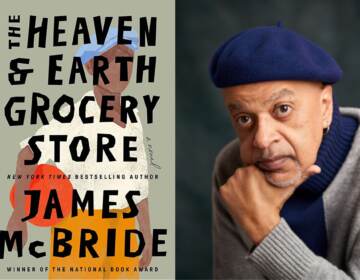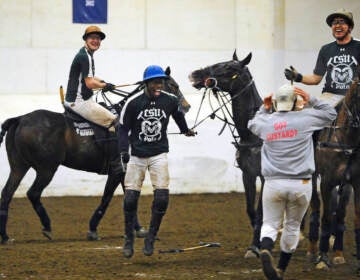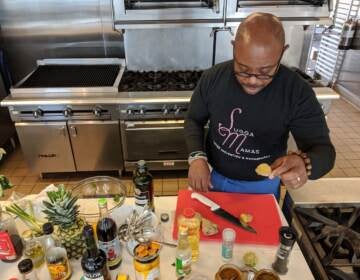At YallaPunk Festival, young Arab Americans throw off stereotypes
-
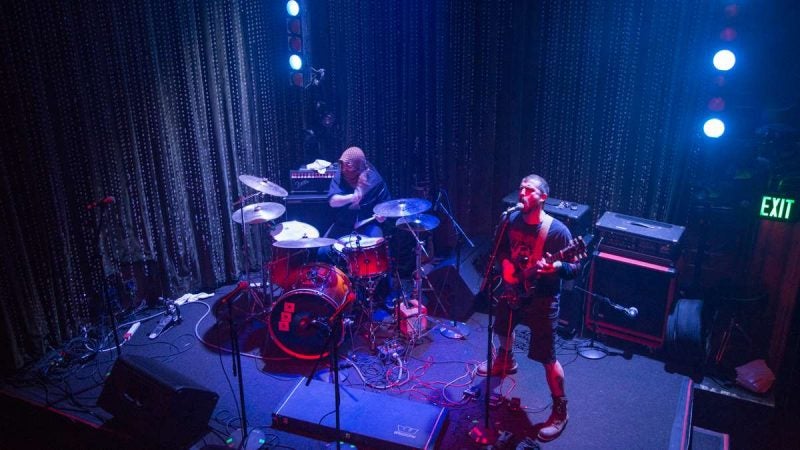
Punk band Night Raid performs at Johnny Brenda's for the first annual YallaPunk Festival in Philadelphia. (Emily Cohen for WHYY)
-
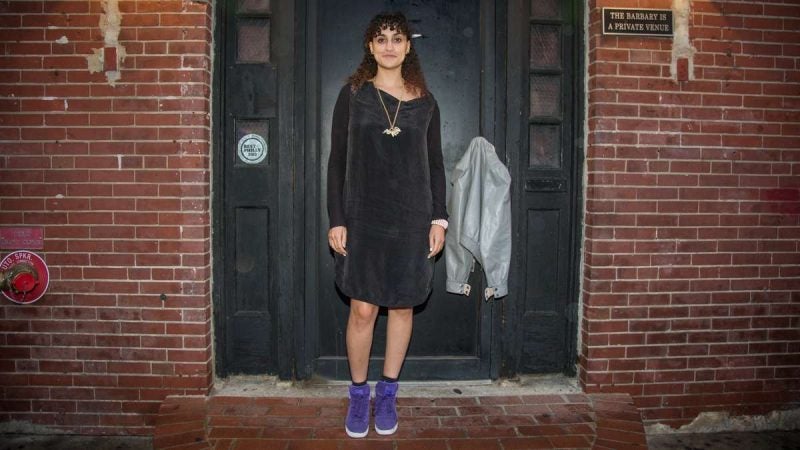
Rana Fayez, 29, is the brains behind YallaPunk. She came up with the festival in response to the increase of negative media depictions of those of Middle Eastern and North African (MENA) descent . YallaPunk Festival is the first Arab-American punk festival in Philadelphia and aims to bring together MENA-Americans to celebrate their music, art, film and other cultural artifacts. (Emily Cohen for WHYY)
-
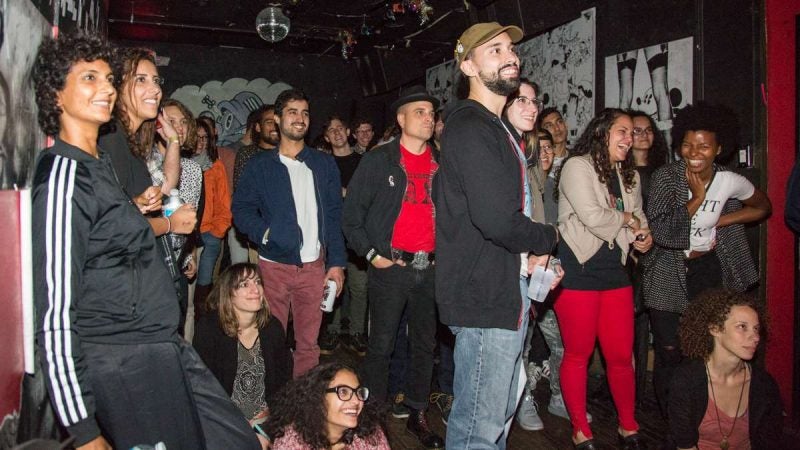
Attendees of the first annual YallaPunk Festival listen and laugh as comedy headliner Aron Kader closes out the day at The Barbary. (Emily Cohen for WHYY)
-
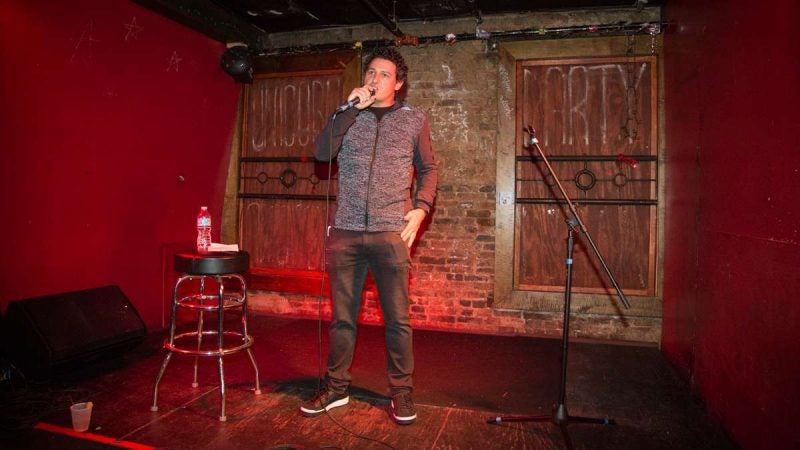
Comedian Aron Kader closes out the first annual YallaPunk Festival in Philadelphia. (Emily Cohen for WHYY)
-
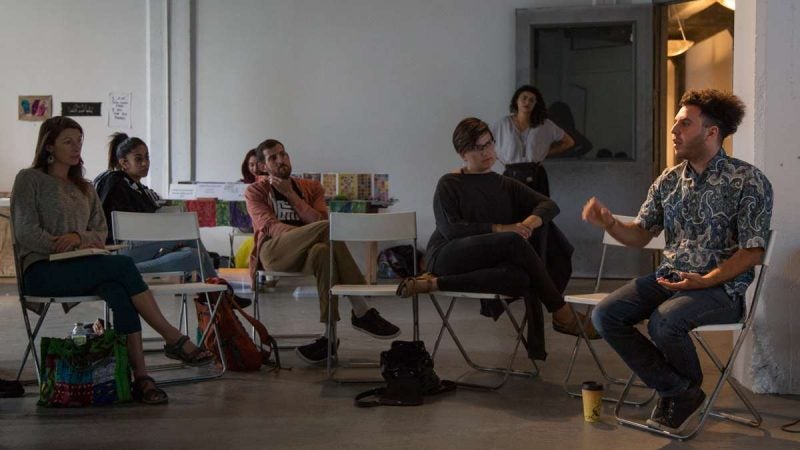
Zein Hassanein gives a talk about ElectroShabbi music, which originated in Egypt, at YallaPunk 2017. (Emily Cohen for WHYY)
-
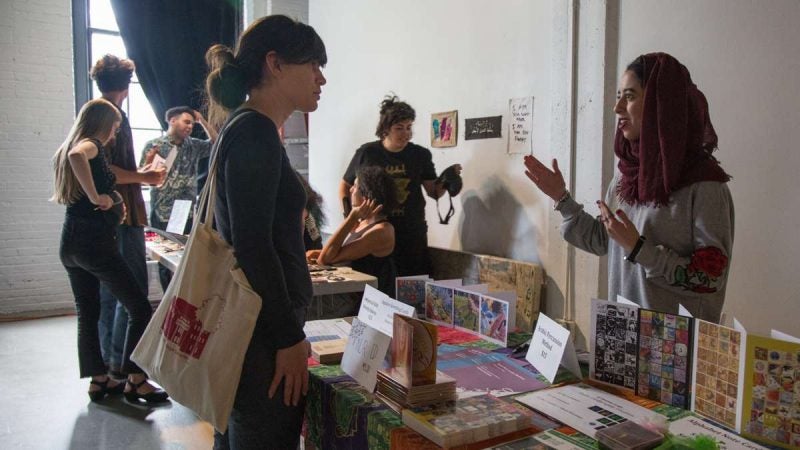
Bushra Alfaraj (right) chats with a YallaPunk attendee about different MENA programing around Philadelphia. (Emily Cohen for WHYY)
-
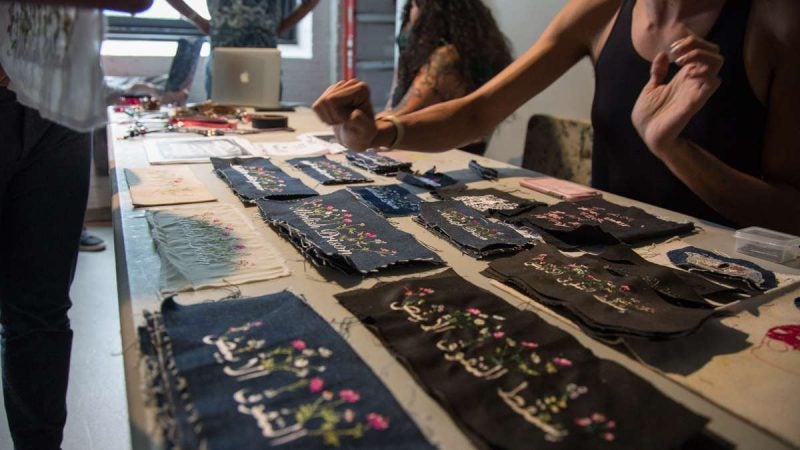
Rose Buttress sells her embroidered goods in the vendor section of YallaPunk. (Emily Cohen for WHYY)
-
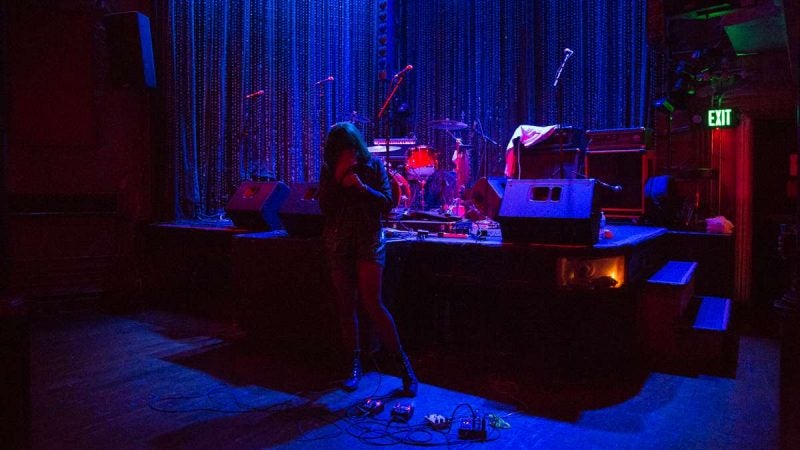
Lime Rickey International performs at Johnny Brenda's for the first annual YallaPunk Festival in Philadelphia. (Emily Cohen for WHYY)
-
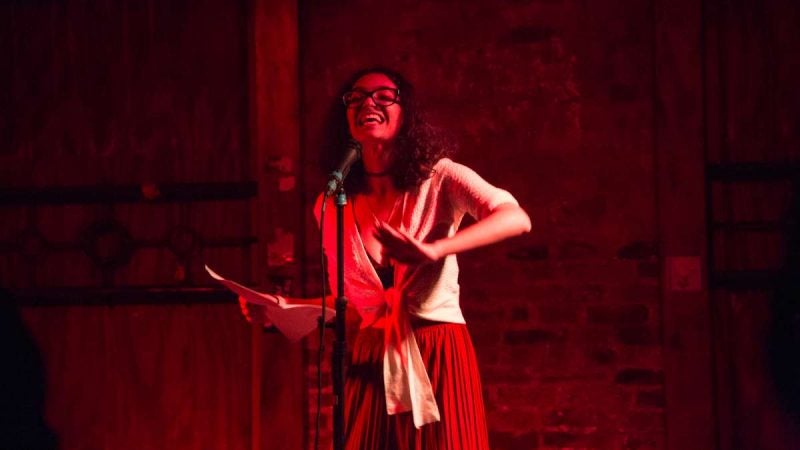
Poet Becca Khail performs at the first YallaPunk Festival in Philadelphia. (Emily Cohen for WHYY)
-
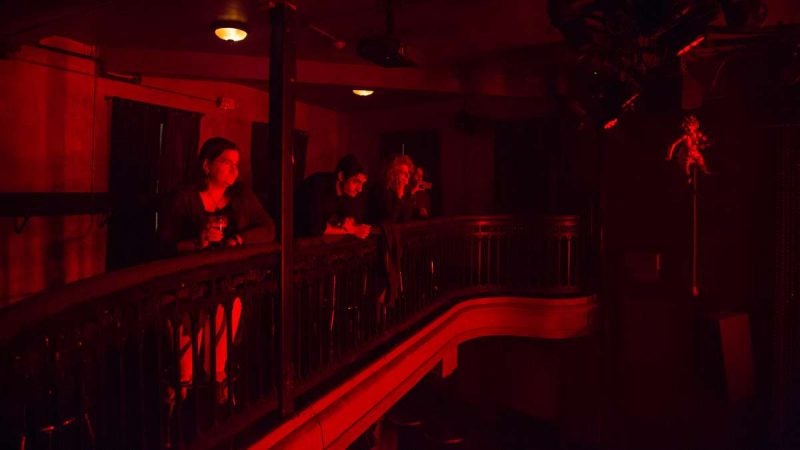
Attendees of the first YallaPunk Festival listen and vibe as punk band Night Raid performs at Johnny Brenda's in Philadelphia. (Emily Cohen for WHYY)
-
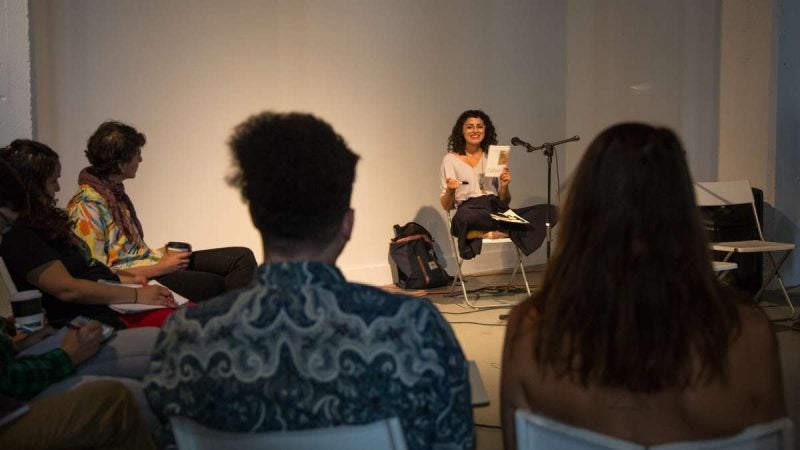
Poet Maryan Nagy leads a workshop on house and home during YallaPunk 2017. (Emily Cohen for WHYY)
-

Sofia Ben-Hur (second from right), of the punk band Flwer Pnk, animatedly talks about their experience with idenity and religion as a MENA artist. (Emily Cohen for WHYY)
-
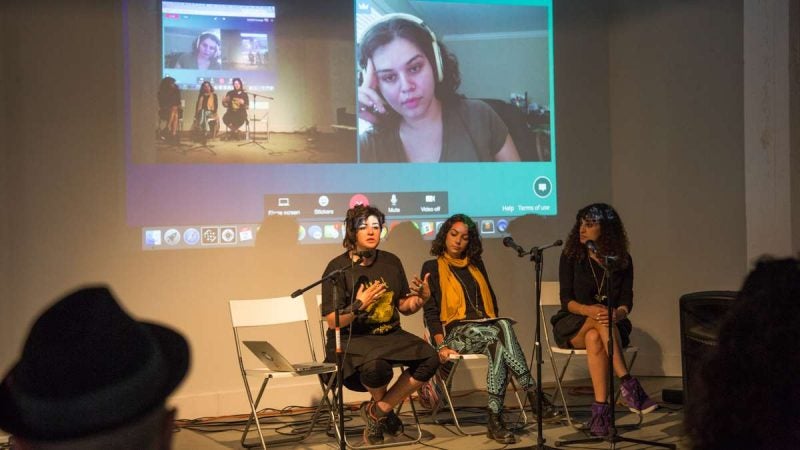
''The Essential Feminist'' panel skypes in Miriam Hakim after Hurricane Harvey blocked her from leaving Houston to attend the panel at YallaPunk. (Emily Cohen for WHYY)
-

Panelists (from left) Marwan Kamel, Rana Fayez, Becca Khalil, and another speaker talk about how to sincerely market yourself as a MENA artist at YallaPunk 2017. (Emily Cohen for WHYY)
-
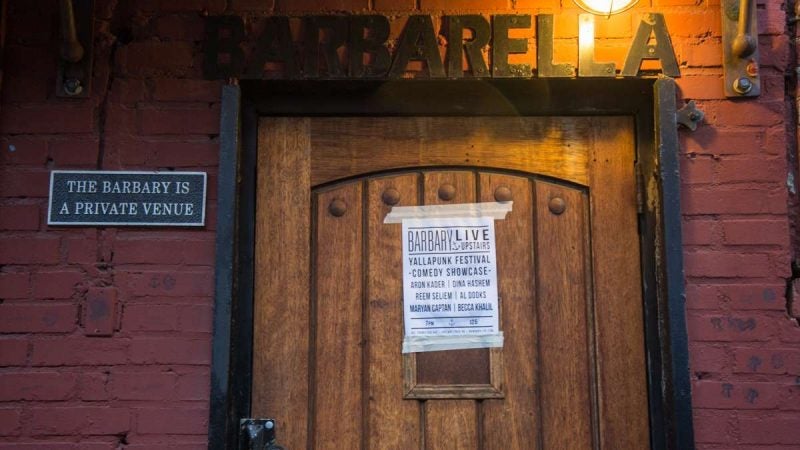
YallaPunk Festival is the first Arab-American punk festival in Philadelphia and aims to bring together Middle Eastern and North African Americans to celebrate their music, art, film and other cultural artifacts. (Emily Cohen for WHYY)
Rana Fayez conceived of the YallaPunk Festival after a frustrating interaction with another member of the Philadelphia music scene.
A promoter was using Arabic lettering on a flier, but Fayez noticed it was gibberish. She asked why they were using Arabic. Were they going to be playing Arabic music? Were they putting on some Arab musicians?
She discovered that the lettering was nothing more than a novelty, another graphic design element. It was then that she started a list of Arab musicians she knew and thought, “Hey it’s been 10 years since I booked my last punk show, I think it’s time to do it again.”
She realized now was the time to redefine the narrative surrounding her community.
“It’s really important to create our own narratives, for our own selves, because if we don’t do that we risk someone else writing our narrative for us, “ said Rana, who immigrated with her family when she was a child and has grown up in the United States.
She grew up with her own internal conflicts and has experienced external conflicts with how her culture has been portrayed in media and the culture around her in the Western world. Now, at 29, she is using all of her identities and connections to bring this festival to being. “You have to build your own institutions if you can’t find any [already out there] that support your arts.”
The YallaPunk Festival, which took place over the 2017 Labor Day weekend, was not only about punk music. A large part of the programing was dedicated to conversation and workshops.
“Music brings out a lot of people and it’s fun, but we needed to create a more holistic experience for everyone by having panels, workshops, discussions, vendors. The education portion of this [festival] is really important as well,” said Fayez.
It was equally important to friend and collaborator, Layla Farahbakhsh. A first generation Iranian-American, Farahbakhsh also felt the struggles with her identity that Fayez felt. For her, being a part of YallaPunk was a way for to explore the different facets of her personal identities.
Farahbakhsh had a big part in the workshops and panels that were offered at YallaPunk, like “The Essential Feminist Panel,” “What does it mean to be a creative MENA and how to sincerely market your creative,” a look into “ElectroShabbi”, a kind of underground music scene in Egypt, and more.
The second day of programing during the three-day festival concluded with an array of performances at both The Barbary and Johnny Brenda’s in Fishtown. The nearly 100 attendees were able to float back and forth between the venues, catching performances by Middle Eastern and North African (MENA) American artists. It was a chance for a generation of MENA creators to perform for an audience of their peers and allies.
YallaPunk meant a lot to a lot of people like Zein Hassanein, who moved to Philadelphia about a year ago from Portland, Oregon.
”I was starting to feel very tired of being the token Middle Eastern person. Coming to Philly and being around this concentration of young brown people that don’t fit into this stereotype was an awesome and big deal [to me].”
Hassanein was looking forward to seeing Aron Kader at YallaPunk. He first saw the comedian when he was in high school in Egypt.
“When the Axis of Evil Comedy tour came to Egypt and I was in the front row and I was like wait, there are Arab-Americans who are funny and doing cool stuff…being able to see him again is like this cosmic re-circling thing that’s happening. I’m re-bumping into people who I should be near.”
As Rana Fayez put it, “We get to be the people who we needed when we were younger,” and that’s exactly what she hopes YallaPunk will become with future programing and next year’s iteration of the YallaPunk Festival.
WHYY is your source for fact-based, in-depth journalism and information. As a nonprofit organization, we rely on financial support from readers like you. Please give today.


